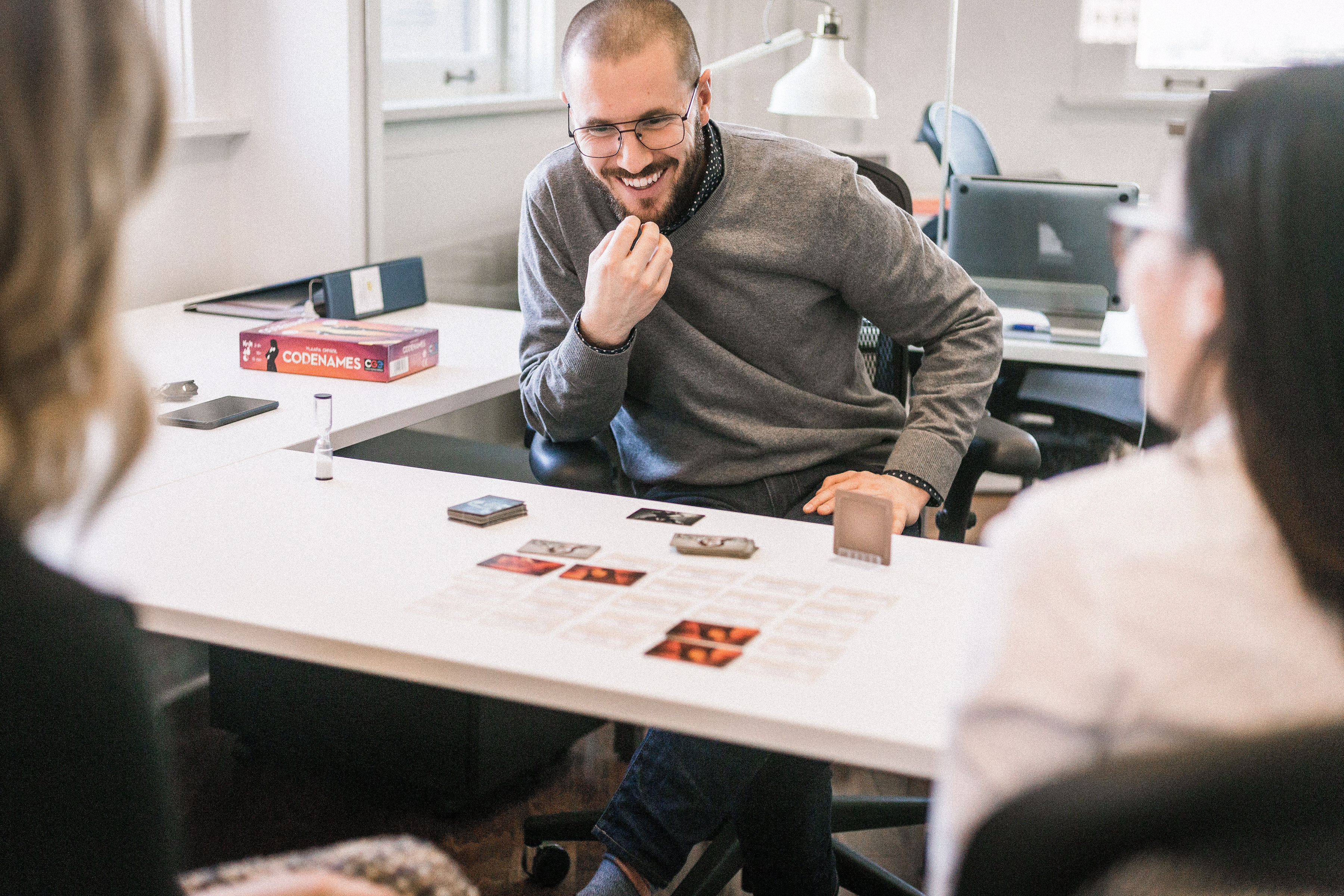
In this interview Culture Assassins co-creator and coffee-lover Tim Reitsma talks with his good friend Geoff Dittrich about the workplace culture at his law firm and some of the soul-searching and hard decisions he had to make along the way to achieve his cultural vision.
Geoff is the Founder and Managing Partner of Ink LLP, a business law firm that provides strategic counsel to entrepreneurs, investors, and high growth companies. He uses his experience in technology and as an entrepreneur to craft practical and creative solutions to the most complex legal challenges faced in business. Geoff spent the first fifteen years of his life growing up in Saudi Arabia. In addition to running a successful law firm he runs a successful household along with his wife, who he proposed to after dating for 6 weeks, and their three kids (at one point they had 3 under 3).
Geoff, why don’t we start with having you talk a little bit about the culture here at Ink?
Well, one of the first tech companies I was involved with before I got into law was in the HR space. The organization was really built around the issue of culture and how to cultivate a culture in any workplace and how to hire for culture.
One idea that resonated with me is that culture is the aggregate of conversations that are happening at your organization. It’s not what I as the managing partner say it is. The reality of culture is what our team is describing it as.
If I sat down and told you that we have a culture where it’s very approachable, doors are always open, it’s very collegial, and all of this sort of thing, but then you go and talk to one of our lawyers and they describe something totally different, then what I said is not actually the culture.
Before this interview I went around to our team and asked them to describe our culture. It was a really cool experience! One of the things that people described to me was the family feel that we have. Law is really interesting in that it is a place where I have found culture to be very uninspiring traditionally, and so we are trying to do something different.
We have the ability and an opportunity to get to know each other in a deeper way than you might at a much larger organization. It’s common to think of culture being built through extravagant team building activities or big dinners out. We decided to cultivate culture by doing things more regularly and frequently, but less extravagantly.
A good example of this is we play board games together every Tuesday and Thursday during lunch. It’s booked in people’s calendars and although it’s optional to join, everyone usually does. We even have a Flying Pig trophy that makes its way around to the winners. This gives our team regular opportunities to play together and forces us away from the temptation of talking about work.

Have you tried a few different things to cultivate that family feel? Have you experienced things that failed or just didn’t resonate with people?
Yeah, last year I spent maybe eight months doing a monthly breakfast where I made pancakes for everyone. It sounded really great and fun in theory but I found that because it was so irregular it didn’t help our team connect in a meaningful way. Conversations would end up being around work and it didn’t feel as natural. Yeah, so despite my pancakes being very delicious [laughing] it just wasn’t the right fit.
You talk about how having regular and frequent culture-building activities is key. What else impacts culture?
Culture is affected by a lot of different variables. I think the structure of the organization plays a part. The way people are compensated plays a part. The communication channels, the job descriptions play a part. There are so many variables that come into culture.
We have learned a lot through our journey about what works and what doesn’t work. One area that law firms struggle with is how siloed individuals become within the organization. Each lawyer typically has their own clients and practice, and even though they’re part of a larger firm, they functionally operate in isolation. Their reputation and financial incentive is tied to their own clients alone, and not as much to the building of the firm and other practices.
We started with that same issue. We had multiple practice areas, each quite siloed from the other. And we found that factions were created in the firm among people based on those practice areas. This is a common issue for law firms, but it was something I was concerned with at a boutique firm of our size, so I knew something needed to change.
It forced me to step back from the day to day of running our firm and my practice, to think more about where we were going in the long run. What do we want to be five years from now? And that was a really inspiring and helpful exercise. Through that process, I developed more certainty and clarity around our firm’s vision. And that vision helped solidify my conviction that we needed to break down the internal divisions and do more to foster unity.
So we changed our model from being siloed in nature to being project-focused, so now every project that comes to our firm we work on collectively. We use many technologies so that everyone knows and is involved in what everyone else is working on and we share and celebrate achievements and milestones collectively.

Was everyone on board with that change?
Change in any context is difficult. For it to work in our context, it was important that I be extremely transparent with everyone involved about why things were changing and where we were going.
I spent a lot of time communicating the vision and getting feedback from everyone on our team about how they saw that vision coming to fruition. Our whole team is a part of that ongoing conversation, and it gives us all a shared sense of buy-in to what we’re doing.
Everyone on our team became entirely refocused in the work they do. We drilled down to what we do best, and brought everyone in on that. We work together on every project that comes through the doors. We integrate project management software so that we can see what everyone is doing at all times. We started regular project huddles so that we could get away from our desks and run through project updates in person. And I try to regularly meet people individually and as a group to revisit the ways we’re pursuing the vision.
We’re in our second year of business now and we have an amazingly cohesive and tight team. It was hugely rewarding to ask the people now about our culture because what they describe is totally different from how it would have been described last year. But at the time it was a huge and scary thing to be confronted with the challenge of pursuing that vision.
We’ve talked about “family”. What other key words or phrases came up when you asked your team about culture?
“Ambition” was one of them. When everyone starts at the firm they have a letter on their desk from me that describes and outlines the values of our firm. One of those values is “Excellence”, which I think is very similar to being ambitious. We have very high standards when it comes to our work product and our client care. We set ambitious goals, and challenge each other in our growth.
“Accessibility” was another that was described, and that’s both internal and external. I know every organization describes themselves as open and having open door policies, but we go farther in practice. I was in my office yesterday working and all of a sudden two people walk in with different questions.
Then a third person walks in and then a fourth and a fifth, just because they saw everyone else going in and they wanted to see what was happening! I told a friend about that experience and they said, “Man, if I saw three or four people going into the Managing Partner’s office I wouldn’t dare walk in just to see what’s happening.” [laughing]
We also practice accessibility when making big decisions on hiring someone. I don’t hire a single person without everyone on board because that affects the culture.

How important is the culture of the companies you work with, in terms of determining whether you’ll partner with them as clients?
Yeah, I think probably more important than culture would be the values of their leaders. We’re not in their offices day-in and day-out. We’re not part of that aggregate of conversations in the organization that make up the culture, but we do work intimately and frequently with the leaders.
The values of those leaders and whether they are aligned with ours is really the litmus test. We do say no to new work and clients that don’t have aligned values.
It affects our culture if we’re working with people that that have drastically different views. I take issues of respect very seriously. Our team knows we will defend and protect and advocate for them.
Do you ever get asked the question, “what would you as a lawyer know about workplace culture?”
I would identify as an entrepreneur well before identifying as a lawyer! [laughing] My passion is business but law is a critical tool in building a business, so our place is being involved in the strategy of building businesses using the tool of law. Almost every law firm I’ve seen has been built by lawyers and not by entrepreneurs, or people that have education in business, or have built a business of their own. If you look at any of the established firms in town the managing partner is simply the most senior lawyer.
They’ve had great success in practicing law and they may be strong technicians, but it’s a totally different skill to be able to build a functioning healthy organization.
As an entrepreneur, first and foremost, I think that gives us an advantage in the way we’re building this business. We certainly have the skills to do challenging legal work, but we also have the business experience to get more creative in how that’s applied. That been a big advantage for us.
We’re young and we’re growing and we’re by no means experts at this. But we’re trying new things and we’re experimenting and through experimentation and innovation comes failure and also success. We also know that culture is kind of like a reputation. It takes a lot of work to build but it’s also very easy to lose. We’ve got something good and we want to protect that.
Mike Gibbons
Mike is one of the Co-Founders at Culture Assassins, a Vancouver-based media company dedicated to preventing the destruction of healthy, high-performing organizational cultures, and to providing people with the tools necessary to build them.
Mike is a results-driven and people-oriented business leader with more than 20 years of experience in organizational and team development, marketing and product strategy, business growth strategy, and operations. He has led multiple teams and businesses, locally and globally, most recently as a senior executive for a $100M division of a Fortune 500 company.
Mike is guided by his deeply-held beliefs in connection, curiosity, humour, empathy, and honesty. In addition to his passion for workplace culture and growth, he is an avid skier, mountain biker, and sci-fi fan.
2 Comments
Add comment Cancel reply
This site uses Akismet to reduce spam. Learn how your comment data is processed.


Vision.
Values.
Yes!!!!
Great interview. I loved “alignment of personal values with business values (both clients and employees)
Thanks Matt! It’s tough to have a healthy culture if the values and behaviours of the org are fundamentally out of alignment with those of the founder! Geoff did a great job course correcting along the way!